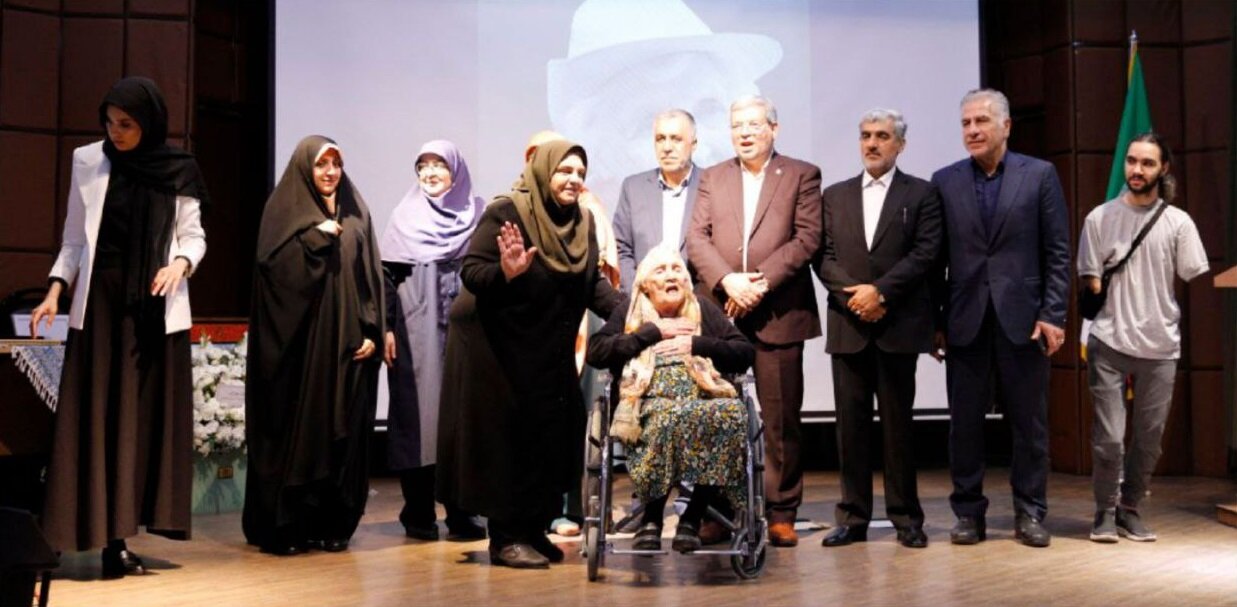Centenarian Samineh Baghcheban honored in Tehran

TEHRAN-A ceremony to honor the eminent Iranian educator Samineh Baghcheban was held Thursday evening at the House of Humanities Thinkers in Tehran.
At the beginning of the ceremony, Ali Rabiei, aide to the president for social affairs, called Baghcheban a woman who has had a lasting role in the folk literature and cultural movements of contemporary Iran, ILNA reported.
“She is a distinguished figure in the field of education, especially for hard-of-hearing and deaf children. She made a major contribution to the development of education,” he added.
“She proved that children’s literature is not merely for entertainment, but a tool for the cultural and social development of future generations. Perhaps no word better describes her than ‘commitment.’ She is a role model for women who wish to play an active role in social and cultural arenas — a mother to society and even a mother to Iran. She began with education at home and expanded it nationally,” Rabiei noted.
“Samineh Baghcheban was not just a teacher — she was a cultural pioneer. Her leadership, teaching, writing, translation, and involvement in establishing institutions for the deaf all testify to her brilliance, perseverance, and commitment,” he stated.
Following that, Fatemeh Mohajerani, government spokesperson, said: “I’m honored to be here among you to pay tribute to a teacher”. She then read a message from the President Masoud Pezeshkian for the occasion.
In his message, Pezeshkian praised Baghcheban’s enduring contributions to Iranian culture, children's literature, and the education of the hearing impaired.
The president highlighted her vital efforts in safeguarding and promoting Iran's cherished intangible cultural heritage through her compilation of stories, folklore, and Iranian songs, which have resulted in remarkable and impactful works in children's literature.
Furthermore, President Pezeshkian noted that Baghcheban’s distinguished name, alongside that of her well-known father, Jabbar Bagcheban— a pioneer in children's education and the founder of the first school for the hearing impaired—will continue to inspire and empower future generations.
Also speaking at the event, Salar Ghasemi, head of the Special Needs Education Organization, said: “Samineh Baghcheban worked alongside her father to educate the children of this land. I’m pleased to announce that we plan to establish a Museum of Culture and Education of Baghcheban soon”.
“We currently have ten thousand deaf students, and we still haven’t found a better alphabet than the one Baghcheban created,” he added.
Mirza Jabbar Asgarzadeh, famously known as Jabbar Baghcheban, established the first Iranian kindergarten and the first school for deaf children in Tabriz. He was also the inventor of Persian language cued speech.
The first kindergarten he established was called “Baghche-ye Atfal,” which means “children's garden”. That is why he was given the nickname baghcheban which literally means 'gardener' in the Persian language.
He founded a school for the deaf in 1924, located next to his kindergarten. In 1928, he wrote the first Iranian children's book in Persian Titled “Baba Barfi,” which means “snow father” in Persian.
Later, the President of the National Association of Sign Language Mohsen Loh-Mousavi took the stage and expressed, via sign language: “Jabbar Baghcheban founded the school for deaf children, and later Thamineh Baghcheban took over leadership of the school and served until 1979. She worked hard for deaf children and helped expand deaf education to other cities. I learned my craft from the Baghchebans, and I urge others not to give up and continue their path.”
The ceremony concluded with the 100th birthday celebration of Thamineh Baghcheban with her presence on stage.
In a short speech, she said: “I have spent my life loving and serving the deaf. If I had another chance, I would choose the same path”.
Samineh Baghchehban was born in 1925 in Tabriz, northwest of Iran. She completed her Bachelor’s degree at Teachers College, Tehran, and was awarded a Fulbright scholarship to continue her studies in the United States. She received her Master’s degree from Smith College in 1953, and a scholarship for students from the Middle East was established in her name at Clarke School for the Deaf in Northampton, MA.
She has dedicated more than six decades of her life to teaching, teacher training, developing the Baghcheban method of teaching Persian to both Iranians and non-Iranians, writing elementary school textbooks that were used throughout Iran, and writing children’s books for both hearing and deaf children.
Her father, the late Jabbar Baghchehban, established the first modern kindergarten of Iran. He was also the founder of deaf education in Iran, developing a phonetic hand alphabet which is unique in its kind in the world.
Initially trained by her father and mentor, Samineh has kept the legacy of her late father alive by continuing his work. Her publications include numerous textbooks, professional papers, and articles in Iranian journals. She has also translated several books from English to Persian.
SS/SAB
Leave a Comment